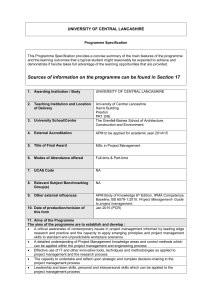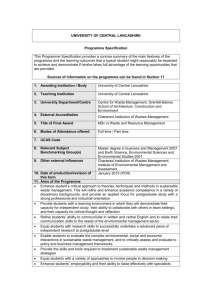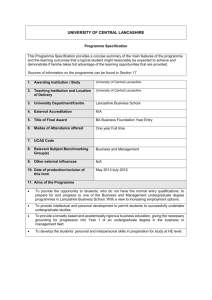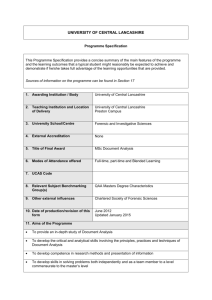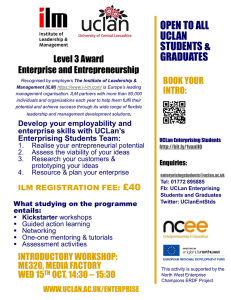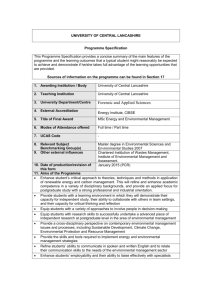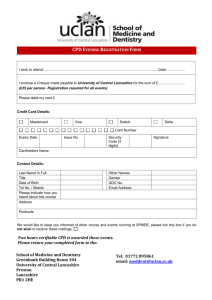Programme Specification - University of Central Lancashire
advertisement
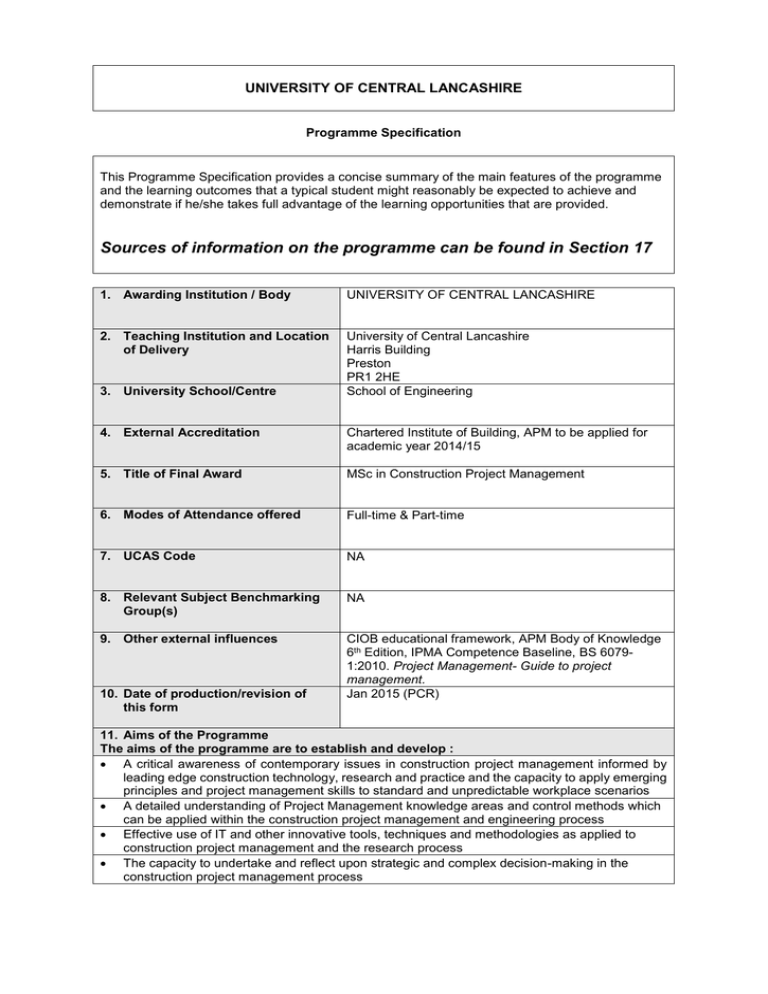
UNIVERSITY OF CENTRAL LANCASHIRE Programme Specification This Programme Specification provides a concise summary of the main features of the programme and the learning outcomes that a typical student might reasonably be expected to achieve and demonstrate if he/she takes full advantage of the learning opportunities that are provided. Sources of information on the programme can be found in Section 17 1. Awarding Institution / Body UNIVERSITY OF CENTRAL LANCASHIRE 2. Teaching Institution and Location of Delivery University of Central Lancashire Harris Building Preston PR1 2HE School of Engineering 3. University School/Centre 4. External Accreditation Chartered Institute of Building, APM to be applied for academic year 2014/15 5. Title of Final Award MSc in Construction Project Management 6. Modes of Attendance offered Full-time & Part-time 7. UCAS Code NA 8. Relevant Subject Benchmarking Group(s) NA 9. Other external influences CIOB educational framework, APM Body of Knowledge 6th Edition, IPMA Competence Baseline, BS 60791:2010. Project Management- Guide to project management. Jan 2015 (PCR) 10. Date of production/revision of this form 11. Aims of the Programme The aims of the programme are to establish and develop : A critical awareness of contemporary issues in construction project management informed by leading edge construction technology, research and practice and the capacity to apply emerging principles and project management skills to standard and unpredictable workplace scenarios A detailed understanding of Project Management knowledge areas and control methods which can be applied within the construction project management and engineering process Effective use of IT and other innovative tools, techniques and methodologies as applied to construction project management and the research process The capacity to undertake and reflect upon strategic and complex decision-making in the construction project management process Leadership and team skills, personal and interpersonal skills which can be applied to the construction project management process Relevant skills in order to pursue life-long learning and continuous development in the context of workplace practice within the subject specialism and international construction project management The ability to identify, retrieve and assess the rigour and value of published research as the source of alternative perspectives that inform and underpin the construction project management decision making process and investigative research Creative and innovative approaches to investigative research including the review, evaluation and selection with justification of appropriate research methodologies and the communication of findings in an objective, coherent and professional manner Develop the student’s research methods and applications 12. Learning Outcomes, Teaching, Learning and Assessment Methods A. Knowledge and Understanding A1. Comprehensively appraise the principles of construction project management in the context of contemporary issues and the implementation process in the workplace. A2. Critically evaluate contemporary roles and responsibilities of the construction project manager, together with the leadership and organisation skills essential to the discharge of this function in the workplace. A3. Select appropriate decision-making and information management tools for construction project planning and project control. A4. Identify, select and critically evaluate appropriate research methodologies relevant to advanced study in the field of construction project management. Teaching and Learning Methods The teaching methods employed will involve lectures, tutorials and the use of ICT workshops. Case study work will be undertaken together with practical tasks contained within project simulation exercises. Assessment methods By completion of written coursework submissions, Learning Logs, online quizzes using the WebCT platform, oral presentation and defence of papers, and using a variety of scenarios and example applications. Peer assessment will additionally be incorporated into the assessment of some modules. The student will be assessed on an individual and group basis. B. Subject-specific skills B1. Critically appraise strategic techniques and solutions to construction project management scenarios and provide innovative solutions to workplace problems B2. Pursue a critical research oriented approach to investigate the application of health and safety, and advanced construction technology within construction project environments through review and evaluation of external factors and leading edge research. B3. Observe and reflect upon group interaction within simulated exercises. B4. Select and apply appropriate methods of data analysis to construction project management scenarios Teaching and Learning Methods The teaching methods employed will involve lectures, tutorials and the use of ICT workshops. Case study work will be undertaken together with practical tasks contained within project simulation exercises. Assessment methods By completion of written coursework submissions, Learning Logs, oral presentation and defence of papers, and using a variety of scenarios and example applications. Peer assessment will additionally be incorporated into the assessment of some modules. The student will be assessed on an individual and group basis. C. Thinking Skills C1. Critically appraise and evaluate concepts of quality, time and financial management to the process of management. C2. Apply appropriate theoretical concepts of construction project management to contemporary projects. C3. Employ appropriate IT and other innovative tools and techniques of project management to contemporary construction project scenarios C4. Review and evaluate methodologies used in a range of research projects and justify the selection of methodologies appropriate to the theoretical perspective or conceptual framework employed in the research Teaching and Learning Methods The teaching methods employed will involve lectures, tutorials and the use of ICT workshops. Case study work will be undertaken together with practical tasks contained within project simulation exercises. Assessment methods By completion of written coursework submissions, Learning Logs, oral presentation and defence of papers, and using a variety of scenarios and example applications. Peer assessment will additionally be incorporated into the assessment of some modules. The student will be assessed on an individual and group basis. D. Other skills relevant to employability and personal development D1. Organise tasks to meet priorities and deadlines within a construction project environment. D2. Select appropriate research strategies and tools to undertake an in-depth research project conducted in the field of construction project management in a workplace situation. D3. Apply skills of oral and written communication in the preparation of clear, fully evidenced and referenced reports and case studies in unbiased and objective form D4. Appraise and evaluate own performance and capabilities through reflective critical analysis. Teaching and Learning Methods The teaching methods employed will involve lectures, tutorials and the use of ICT workshops. Case study work will be undertaken together with practical tasks contained within project simulation exercises. Further use of research skills within the research methods module will enable highlevel research skills and information management and processing to be developed and applied to the subject area. Assessment methods By completion of written coursework submissions, learning logs, oral presentation and defence of papers, and using a variety of scenarios and example applications. Peer assessment will additionally be incorporated into the assessment of some modules. 13. Programme Structures* 14. Awards and Credits* Level Module Code Module Title Credit rating Level 7 BN4609 Dissertation 60 BN4400 Advanced construction technology 20 BN4410 Health and safety management 20 BN4440 Strategic project management 20 BN4430 Project team and leadership development 20 Postgraduate Diploma in Project Management with pass/merit/distinction BN4206 Risk and value management 20 (Exit award) BN4010 Project planning, control and analysis 20 Masters of Science in Project Management with pass/merit/distinction Final award Requires 180 credits at Level 7 Requires 120 credits at Level 7 Postgraduate Certificate in Project Management with pass/merit/distinction (Exit award) Requires 60 credits at Level 7 15. Personal Development Planning The programme features defined PDP elements, these being: Alignment with the Association of Project Management knowledge areas (edition 5). Each module contributes to the APM Evidence Map. This enables candidates to contribute to the attainment of the APM’s project management competencies for APM membership. Module BN4430, Team Leadership and Development, requires the student to candidates complete a self-reflective analysis of their leadership and team working skills from which transferable skills can be identified. This analysis is reviewed with tutors in workshop and tutorial sessions and action planning is used to drive the development process. 16. Admissions criteria Programme Specifications include minimum entry requirements, including academic qualifications, together with appropriate experience and skills required for entry to study. These criteria may be expressed as a range rather than a specific grade. Amendments to entry requirements may have been made after these documents were published and you should consult the University’s website for the most up to date information. Students will be informed of their personal minimum entry criteria in their offer letter. General The minimum entry requirement for the course is a recognised British honours degree or its equivalent in a construction or an engineering discipline that demonstrates an awareness of the construction processes and procedures. Those with non-cognate degrees are required to satisfactorily complete a bridging course module that satisfies the pre-masters requirements of the CIOB Educational Framework. Applicants who do not satisfy the standard minimum entry requirement can be admitted on the basis of equivalent prior experience or learning details of which can be found at: http://www.uclan.ac.uk/information/services/sss/accreditation/index.php The course is subject to the University’s Admissions Policy & Code of Practice which can be accessed at the following link: http://www.uclan.ac.uk/information/services/sss/admissions/index.php Applicants must be able to provide evidence of English Language competence and an IELTS score of 6.5 (or equivalent). Students who do not meet minimum language entry requirements may be offered a place on an UCLan preparatory English programme, for which the minimum level required is IELTS 3.5. Selection Procedure Notwithstanding the foregoing requirements the Admissions tutor will normally interview all nonstandard applicants. This will provide the opportunity to visit the School and speak to staff. In each case, account will be taken of such factors as motivation, enthusiasm and overall suitability for the course. 17. Key sources of information about the programme The Grenfell-Baines School of Architecture, Construction and Environment’s current website: http://www.uclan.ac.uk/scitech/built_natural_environment/course_information/cpm.php UCLan’s Postgraduate course prospectus Course Leader : CHRIS O’FLAHERTY Tel 01772 893238 email cjo-flaherty@uclan.ac.uk 18. Curriculum Skills Map Please tick in the relevant boxes where individual Programme Learning Outcomes are being assessed Programme Learning Outcomes Core (C), Other skills relevant Compulsory to employability and Module (COMP) or Knowledge and personal Level Code Module Title Option (O) understanding Subject-specific Skills Thinking Skills development LEVEL 7 A1 Note: BN4609 DISSERTATION ADVANCED CONSTRUCTION BN4400 TECHNOLOGY HEALTH & SAFETY BN4410 MANAGEMENT STRATEGIC PROJECT BN4440 MANAGEMENT PROJECT TEAM & LEADERSHIP BN4430 DEVELOPMENT RISK & VALUE BN4206 MANAGEMENT PROJECT PLANNING, BN4010 CONTROL AND ANALYSIS A2 A3 COMP COMP COMP A4 B1 B2 B3 B4 C1 C2 C3 C4 D1 D2 D3 D4 COMP COMP COMP COMP Mapping to other external frameworks, e.g. professional/statutory bodies, will be included within Student Course Handbooks
